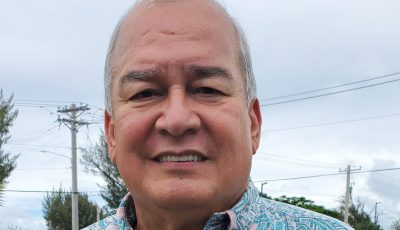Kilili bill backs indigenous fishing, puts fees in NMI treasury
WASHINGTON, D.C.—Delegate Gregorio Kilili C. Sablan introduced legislation in the U.S. House of Representatives yesterday fine-tuning national fisheries policies. Sablan’s Fishing Economy Improvement Act proposes a greater role for indigenous people in the management of fisheries and provides for certain fishing fees to go directly into the Commonwealth treasury. His bill also reauthorizes the Magnuson-Stevens Fishery Conservation and Management Act, which is generally credited with making America’s fishing industry, and the fish stocks upon which the industry depends, more sustainable.
Sablan has been working on drafting the legislation since last year and used the time as he recovered from back surgery over the last six weeks to complete work on the 15 separate sections of policy contained in the bill.
In his introductory statement yesterday, Sablan recalled the hours of testimony that he has listened to in the House Natural Resources Committee over the last two years regarding reauthorization of the Magnuson-Stevens Act. “That experience made clear that there are a number of areas where there could be bipartisan agreement on improvements [to the Act],” Sablan said.
One of those areas of bipartisan agreement has to do with ensuring that Pacific Islander, Native Alaskan, and Native American subsistence fishing interests are represented on the eight regional fishery management councils created by the Magnuson Act.
“The people of the Northern Mariana Islands…have a tradition of livelihood from the sea that goes back for millennia and continues to this day,” said Sablan. “These island fishermen and women should have a seat on the Western Pacific Regional Fishery Management Council, right beside the industrial users—as should Native Alaska and Native American subsistence users on other regional councils.”
Sablan also wants islanders to have a more official role in the international organization that is responsible for managing and conserving tuna and other highly migratory fish in the Pacific. His bill requires that one of the five U.S. seats on the Western and Central Pacific Fisheries Commission always be held by a resident of American Samoa, Guam, or the Northern Mariana Islands. The seat would rotate among the three island jurisdictions.
Fishing fees for the Northern Marianas
In addition to a greater voice in management for traditional fishing interests, Sablan’s bill provides for direct payment of fishing fees to island governments. “When the rights to fish around the Northern Mariana Islands are sold, the fees should go directly to the government of the Northern Mariana Islands,” Sablan said.
“Right now, some of those fees go to WestPac, the federal regional council, and WestPac has to use the funds for marine conservation. I am not opposed to conservation. We cannot have a strong fishing economy unless we manage stocks sustainably and maintain the overall health of the oceans.
“But revenues from Northern Marianas resources belong to the people of the islands. Their own government should decide the best use for those funds—not WestPac, a federal agency. My bill helps ensure that revenues from fishing around the U.S. Pacific islands, such as the Northern Marianas, go to the people of those islands.”
Sablan identified his island culture as influencing other aspects of the Fishing Economy Improvement Act. “The people of the Pacific islands have a deep cultural tradition of decision-making by consensus. In that spirit I ask that Members on both sides of the aisle consider whether there are areas of fishery management where we can find common ground.
“For instance, the Fishing Economy Improvement Act proposes that we improve fisheries data collection through the use of electronic monitoring and that we overhaul the way that the federal government manages this data so that we get the most value from it.”
Sablan’s bill also increases opportunities for public participation in the fishery management process by requiring widely accepted, modern-day practices such as live, online broadcasting of fishery council meetings. And the bill allows for data collected by states from recreational fishing to be incorporated into federal assessments of the health of fish stocks.
“These are all ideas that find wide agreement on both sides of the aisle and could further improve the effectiveness of the Magnuson-Stevens conservation and management practices we already have in place,” according to the Northern Marianas congressman.
Rep. Don Young (R–Alaska) has also introduced legislation, reauthorizing the Magnuson-Stevens Fishery Conservation and Management Act, which could be marked up by the House Natural Resources Committee as early as this month. (Office of the Delegate)



























